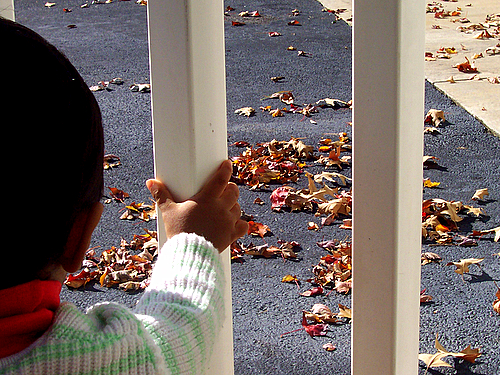
(Photo: Flickr / Nisha A)
Millions of our nation’s children are suffering such a dangerously high level of trauma and emotional distress that their futures are seriously imperiled. In this instance, it’s not domestic violence or physical abuse, it’s not our dangerously militarized low-income public schools or our abusive juvenile justice system that’s the culprit—although these do also traumatize millions of our nation’s children. It’s the fact that our broken system of aggressive criminalization and mass incarceration has imprisoned their moms and their dads.
Over five million of our nation’s children, according to a new report by the Annie E. Casey Foundation, entitled A Shared Sentence: the devastating toll of parental incarceration on kids, families and communities, are suffering levels of trauma equal to the trauma of domestic violence and abuse as they experience the loss of a parent to incarceration.
We are a nation who incarcerates more people than any other nation in the world. Our notorious “tough on crime” policies saw a 500 percent increase in children losing a parent to incarceration between 1988 and 2000, according to Casey report. And because our criminal justice system is disproportionately enforced upon low-income, black and Latino populations, it is those children who are suffering the most. Most are younger than 10 years old. Many are younger than four.
As the report states:
These children feel the absence of that adult — whether it is several nights in jail or years in prison — in myriad ways, even if they weren’t sharing a home. They feel it when their refrigerator is bare because their family has lost a source of income or child support. They feel it when they have to move, sometimes repeatedly, because their families can no longer afford the rent or mortgage. And they feel it when they hear the whispers in school, at church or in their neighborhood about where their mother or father has gone.
These children lose parents at critical times of their development, increasing chances of anxiety, depression, poverty, educational achievement. Not only do the children suffer, the report says, but families and communities are devastated by these losses as well. Even when these fathers and mothers are released, a whole new set of obstacles may interfere with their ability to properly care for their children as criminal records can limit access to everything from a job, to housing, to public assistance.
As our country grapples with the devastation wrought by the “three strikes“ sentencing legislation, harsh drug sentencing laws and other disastrous “tough on crime” policies of the past few decades, the effects on the innocent children trampled in the wake are too often ignored.
What can be done? This new report has several recommendations. First among them is to ensure that children are supported during and after the incarceration of a parent. Returning parents also need assistance breaking down the barriers to jobs, good pay, housing, health and mental healthcare and food for their families. Communities need to be rebuilt and supported. One way to fund such supports, the report recommends, is the adoption of the Justice Reinvestment Initiative which would analyze the ineffective and costly approaches to criminal justice issues and reinvest in better, safer and more cost-efficient alternatives and policies.
At a time when millions of our children are already suffering from poverty, from domestic abuse, from a school-to-prison-pipeline and a broken juvenile justice system, how can it be that we also are allowing over five million children to be traumatized by the loss of parents caught in the hysteria of mass incarceration? A country that allows such massive infliction of trauma on its children is a country whose entire future is in question. Fortunately, there are concrete steps we can and must do to change it.